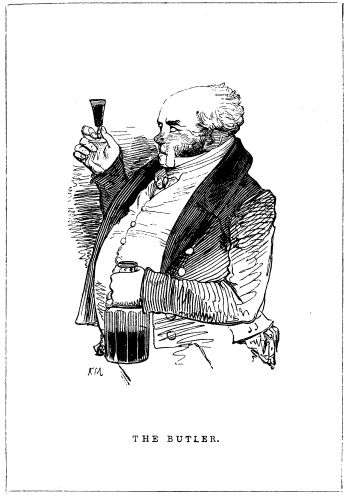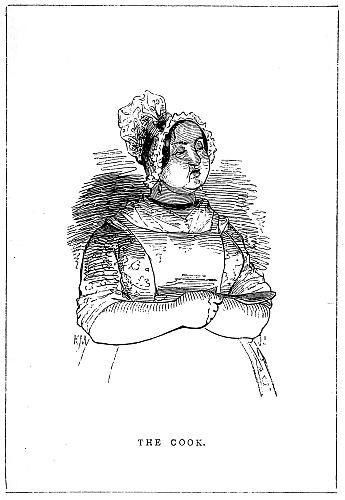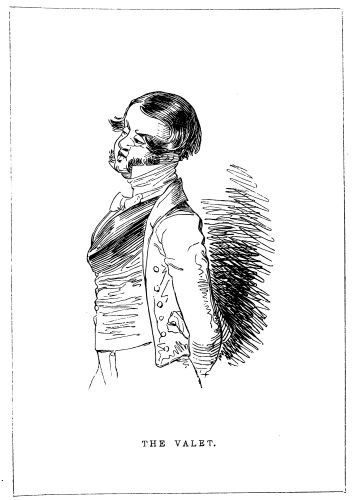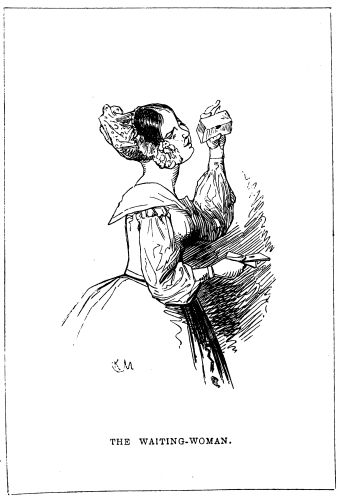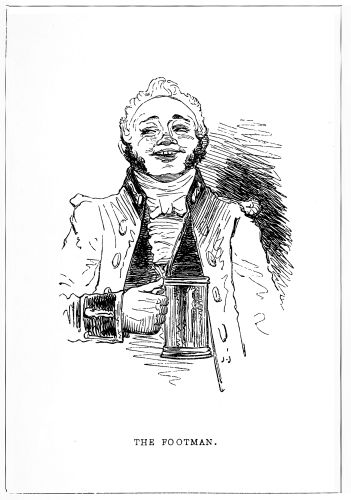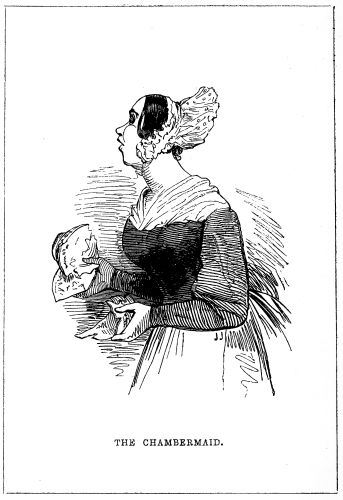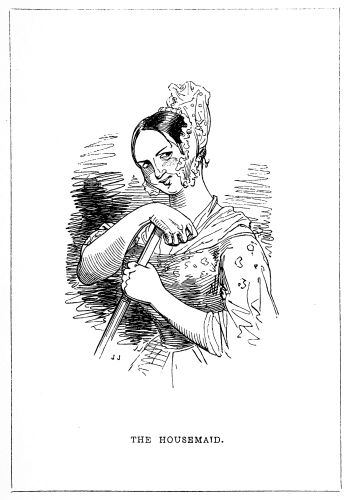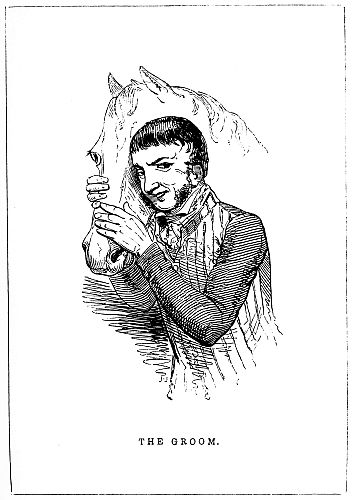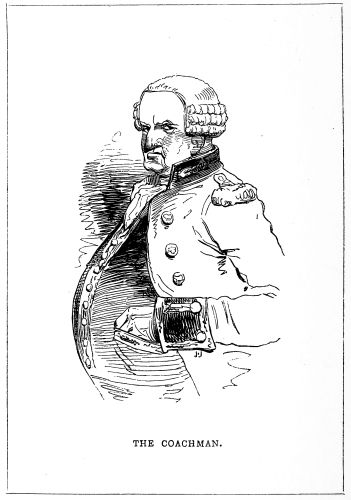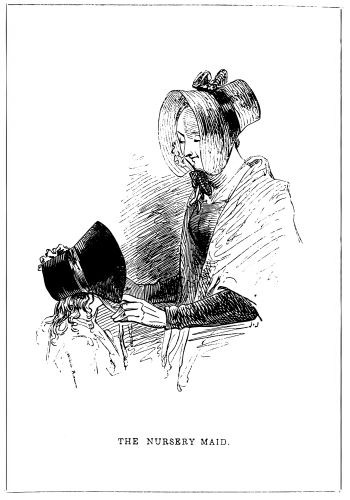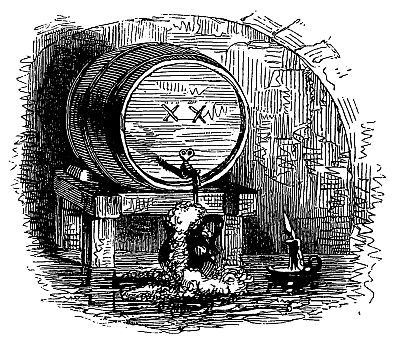Beware, though, while you thus importune,
Don't get the girl, and miss the fortune.
I knew a brother of our craft,
Who slyly tied the knot, and laugh'd
To think Papa must prove forgiving,
And find them both the means of living:
And so he did, (here fain I'd stop,)
He fix'd them in a fruit'rer's shop!
With final 'leave'—a precious warning—
To "send for 'orders' every morning!"
You go to plays, you quiz the Cits,
Become great critics, shine as wits;
Ne'er at a loss for something caustic,
And quite at home at an acrostic:
And whilst thus flippant, sprightly, able,
Can scorn a hooting from the rabble.
I venerate your office truly,
Having but doff'd the livery newly,
And, like yourself (as I've a notion),
Am looking out for high promotion.
If you are wise, care not a louse
[38]For places in the Custom-house;
By which some think, with much parade,
Our services are more than paid;
But, list to me, a better ending
You'll make, though far less condescending.
To learn fresh secrets, make a swop at,
Without reserve, each house you stop at;
And be not merely on the sly
To pick up trash, but make it fly.
Thus have it said, where'er you came,
Instead of robbing them of game,
You've shown a large, a lib'ral bounty,
And furnish'd sport for all the county!
Never be seen with bundle or basket,
(A proper Master wouldn't ask it);
Some blackguard boy, a closet hid in,
You'll always find to do your bidding,
Repaid with scraps (sufficient treat)
As you shall think both fit and 'meat.'
The self-same boy, with self-same pay,
Cleans all the shoes; again next day
He re-appears, just in the nick,
[39]First cuts the loaf, then cuts his stick!
When errands you are sent upon,
Be sure to blend them with your own;
The boy can't deputize, 'tis clear,
When it's to drink a pot of beer
Or kiss your sweetheart; either wicket,
Wants an untransferable ticket.
Remember, when you wait at table,
To pick up all the wit you're able,
For bits of songs and scraps of plays
Turn to account a thousand ways;
You'll find yourself downright bewitching
With all the ladies in the kitchen,
Who'll swear you give such rare delight,
That brother flunkeys die with spite,
Venting new slanders without end;
For why? 'a fav'rite has no friend!'
The reason's plain why so abusive,
All hate an out-and-out exclusive!
When on a message you are sent,
(On your own whim more strictly bent,)
Choose your own words, and jargon even,
[40]Though to a Duke or Duchess given:
How should your Lord or Lady know
About it half so well as you?
And for the answer, (till you're bother'd,)
Let that be quite completely smother'd;
Or given at all, adorn'd just so
As you think proper things should go.
You're the best judge what sort of friends
(Best suiting with your private ends)
Will suit your general contriving,
And keep the household snug and thriving.
In all affairs of compliment
Not meeting with your full consent,
Contrive to knock up quite a pother,
And set each party 'gainst the other,
Raising a feud so fierce and wild
As never can be reconciled;
The best of friends make out neglectful,
And 'ev'ry think that's disrespectful;'
Nay, should the deuce himself so twist it
That you 'not no how' can't resist it,
You'll turn the kindest invitations,
[41]Into malignant accusations!
And thus both parties, lost in wonder,
Of course you keep quite poles asunder.—
Instruct 'your people' when to roam,
Or kindly 'let em' be 'at home;'
Where, for the present, while we leave them,
May no curst tell-tale undeceive them!
To be in lodgings when your lot,
And there's no shoe-boy to be got,
You'll clean your Master's, without hurting
At all—the bottom of the curtain;
Or, if you have the exceeding nerve,
Your Lady's apron then may serve.
Scrape not your own, like vulgar mortals,
Standing outside your Master's portals;
But of your cleanliness to vapour,
Use the hearth-rug, and save the scraper!
Ask not for leave each rambling bout,
The less your fear to be found 'out;'
Though p'raps you've had a bout of kissing,
And no one knows you've e'er been missing:
All that your fellow-servants know,
[42]You left but "scarce a min't ago."
Snuff candles with your fingers' ends;
And for the stench to make amends,
Think that your Master scarcely suffers
The least expense for polished snuffers;
Throw down the snuff upon the floor,
And what can man, or Footman, more?
It quite an easy thing to scoff is,
But candle-snuffing's quite an office!
Contrive it, when you know you're wanted,
To shun the room as if 'twere haunted;
But when there's private conversation,
Rush in, a downright congregation!
If left unchid, then all is well;
If not, then swear you heard the bell.
Secrets that 'drop' from gents and ladies,
The best of all your stock in trade is;
While you, a course more cautious steering,
Let nothing 'fall' within their hearing.
Indiff'rent still to praise or blame,
You soar above the sense of shame.
"The tea is good, the coffee ain't;"
[43]Then give 'em 'grounds' for the complaint.
No matter if the pot boils over,
Come what come may, you're still in clover:
Swear you took pains, 'more than a little,'
To please their palates to a tittle.
The march of blame begins to halt,
They pardon beg for finding fault,
And "ne'er again will blame in haste,
But all their mouths were out of taste!"
Thus you're repaid for all your trouble,
Enjoy the 'squeak,' nor burst the 'bubble.'
You cry, "Enough, then, for the present;"
Yet list to something still more pleasant.
I'll tell you how, if you're but willing,
From deepest fob t' extract a shilling.
A present when desired to carry,
If but a sorry pumpkin,—marry,
Make as much fuss (or even greater)
Than if it were a gold repeater;
Send up your Master's strict commands
To give it safe with your own hands.
This to the purse-strings gives a shock,
[44]They can't but find out what's o'clock:
In other words, they're wide awake,
The money's yours, and no mistake!
When your own Master gets the like,
A brace of barbel, bream, or pike,
Stir up his generosity
To tip your friend a double fee;
Go snacks then with your liveried brother,
'Good servants always help each other!
All for our Master's truest glory,
At least while I may tell the story.
When you 'step out' for tittle-tattle,
A pot of ale,—a wench's prattle,—
To hear a street-professor sing,—
Or see a brother-footman swing,
Leave the door open to save knocking,
Or Master's nerves the slightest shocking:
Say your young Lady for a cab sent,
Or swear black's white,—you've ne'er been absent;
Or, of belief to take a fresh hold,
No, "never stirr'd from off the threshold!"
'Howsever,' if it's yet a lie,
[45]You have it still 'as cheap as I.'
In all disputes with cabmen, chairmen,
Act as if 'listed to be their men.
You "can't a-bear it, to be hard on
Poor fellows, that can't spare a farden."
Share in their woes, it ne'er can fail;
Then share in foaming pots of ale.
For all the world the greatest bore,
That makes a Footman feel most sore,
In winter burn, in summer shiv'ry,
Is wearing that curst thing,—a livery!
Choose, if you can, where some such queer one,
Although a neither cheap nor dear one,
May make you, from the thing you're wrapt in,
To pass for some outlandish Captain.
Put on fierce airs, 'tis sure to do,
Stare all the people through and through;
A foreign Count at least, not come short
A man of 'great account' of some sort.
Well, after all, man! never mind
The scurvy jeers of all mankind;
Keep up your spirits—quite the dandy,
[46]If only through your Master's brandy!
Fortune, at times, makes her approach, man,
Both to the Footman and the Coachman;
Without a moment to consider,
You've luck to marry a rich 'widder.'
At noon your Lady calls the carriage,
When least you dream of aught like marriage,
Calls at a Chapel by the way,—
You're up to what's the time of day!
Bring home, inside, your lady wife,
Thenceforth to have and hold—for life!
Without such luck, or some preferment,
To make an end, I make averment,
Your post of honour is the Road,
And longer not to be withstood.
There's none dare venture the expression
A Highwayman's a low profession;
A short life and a merry one,
Make one grand splash, and all is done!
One last advice you'll say is owing,—
When to be hang'd you find you're going,
Which, for the robbing of your Master,
[47]Or some contingent slight disaster,—
Just knocking up a bit of bobbery,
Manslaughter, or a highway robbery,
So probably the lot of one,
Vivacious, ever fond of fun,
(Risking a mere ignoble carcass
To emulate some noble Marquis),
Fast-going ones, at naught who'd stick.
To pass for a right (Flanders?) brick,—
Mark only this, your good behaviour
Wins, with your craft, eternal favour.
Deny, with loudest imprecations:
They'll throng the court with attestations
"Such honesty—before all men—
None e'er had yet, nor will again!"
Confession make on no pretence,
Save turning round King's evidence;
(I don't suppose, though, aught I say
Will save your neck another day,)
Your noble spirit, never vex it,
But make a sentimental exit!
The Lord May'r 'll do whate'er he's able,
[48]"Hoping you've all things comfortable!"
Ladies will send you costly flowers,
To mollify your dying hours;
And 'white Japonicas' shall thence
Be emblems of your innocence!
Pretend (to make the Parson stare)
An extra-Ord'nary love of prayer;
The Jailer give a fond adieu,
And squeeze the Sheriff's hand in two.
As for the Hangman, make a pother,
As if you'd found a long-lost brother:
Some pledge of kindness give the Mayor,
If but a ringlet of your hair!
Thus, to the last, the gallows grace,
And none shall say, you've "lost your place."
—————
Thus far our Dean,—but happier times
Now wait on bolder, deadlier crimes,
When wisdom mourns o'er wise restraints,
And murd'rers serve for martyred saints.
With laws so changed, a realm's disgrace
[49]Springs from a pot-boy 'out of place;'
When all but starts the maudlin tear,
For sufferings of a Courvoisier;
And Pity grasps the hand imbrued
In a confiding master's blood!
When the most hardened knave has hope
Of all things needful—but a rope!
And nought excites the mortal pang,
Save to behold a felon hang.
And why? Howe'er the de'il may angle,
In his 'right mind' no man would dangle;
Or, 'Monomania' far away,
Have a clear right to Bot'ny Bay;
For I've no trouble in believing
A 'Monomania' for thieving!
What fee, then, shall that Counsel grace,
Who'll fairly make out such a 'case?'
Can such 'opinion' e'er be bought?
I'm quite 'transported' at the thought!
Let sober Judges, then, give way,
And let Mad-doctors have the sway!
Let all things (for a time) be shown
[50]As only right when upside down!
Yet while these 'epochs' intervene,
Well may we cry, "God" save our Queen!
Now call me Whig, or call me Tory,
Wise rulers all, I yet implore ye,
Some better safeguard may be known
Both for the people and the throne;
For though no Radical, most sure
I grudge the Hangman's sinecure!



